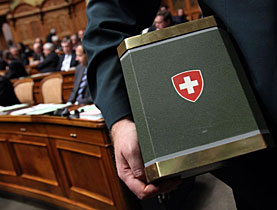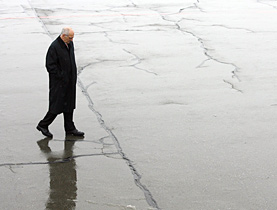Cabinet candidates back “fifth Switzerland”

How much does the successor to Interior Minister Pascal Couchepin know about the 700,000 Swiss who live abroad?
swissinfo.ch questioned the three official candidates on the so-called “fifth Switzerland” ahead of the election by parliament on September 16.
The centre-right Radicals – Couchepin’s party – are maintaining their claim to two seats in the seven-strong cabinet and have nominated two official candidates: Didier Burkhalter from Neuchâtel and Christian Lüscher from Geneva.
The centre-right Christian Democratic Party, which has an eye on the cabinet seat it lost in 2003, has put forward Fribourg senator Urs Schwaller.
Although parliamentarians aren’t obliged to pick an official candidate – and although the rightwing Swiss People’s Party is yet to reveal its game plan – a surprise is considered unlikely.
Despite their different cultural and political backgrounds, Burkhalter, Lüscher and Schwaller all agreed on advancing the ambassadorial role played by Swiss expatriates, saying this was all the more necessary in times of crisis.
They also agreed on the importance of the fifth Switzerland in terms of influence and image for the country. Each candidate promised to see to it that links with expatriates were maintained – indeed tightened – and that communication with the network that they represent was improved.
Swiss schools
Regarding potential problems, Lüscher said he was ready to work to ensure that the “Swiss abroad are not discriminated in any shape or form compared with their compatriots”.
Burkhalter spoke of “the concerns of Swiss in the United States regarding banks, the question of Swiss schools abroad and participation by expatriates in [Swiss] political life”.
Schwaller prioritised the issue of Swiss schools. “It is vital to ensure the continuation of these schools and to give them the chance to plan for the medium and long term,” he said.
Burkhalter and Schwaller both backed the increase to SFr20 million ($19.1 million) for the amount allocated to Swiss schools by the government when the 2008 budget was voted on, although they both believe calls for a report on this issue are justified.
“The aim is not to put these schools in danger, but rather to better understand how they function in order to be able to guarantee them a more durable position in the debates over finances, which will be difficult in the coming years,” Burkhalter said.

More
Magic Formula
E-voting
The three candidates also acknowledge the need for that other hobby horse for the Swiss abroad: e-voting.
“In principle, I’m in favour. We still have to make sure that this type of voting is secure from a technical point of view,” said Lüscher, adding that Geneva was a forerunner in this area.
As for the issue of political representation of the Swiss abroad, there is no miracle solution.
If the three candidates are adept at coming up with demands on this subject, the idea of a proposal by the centre-left to create a “27th canton” made up of the Swiss abroad has not proved that popular.
Schwaller admits to having “quite a few reservations” concerning the creation of a new electoral constituency.
Lüscher says this idea is “constitutionally complicated” and Burkhalter, while finding the direct participation of the Swiss diaspora in parliament “interesting”, nevertheless believes that “finding a proposition capable of winning a majority will not be easy”.
International role
Now that crises seem to feature one after another in Swiss current affairs, does Switzerland’s isolation – highlighted by numerous commentators – concern the candidates?
Burkhalter says he first became aware of the state of law at the age of 18 when he was on a trip to Algeria and the police temporarily confiscated his passport. It is vital “not to dramatise things”, he remarked.
“First of all you have to trust the Swiss position, defend it better and explain it better. And perhaps make greater diplomatic offensives abroad,” he said.
His two rivals are less confident. “Many countries are our friends, but not necessarily friends who will fight for us,” Schwaller lamented.
In his view Switzerland needs to hone its strategies regarding economic development, education and foreign policies.
Lüscher, who spent one year in Louisiana as part of a postgraduate degree, also insists on the strengthening of international relations.
“The key to our relations with the West goes through a strengthening of our relations with the US. It’s also necessary to turn towards Asia, in particular China,” he said.
Carole Wälti, swissinfo.ch (adapted from French by Thomas Stephens)
According to the Swiss foreign ministry, 676,176 Swiss lived abroad in 2008 (+1.2% on 2007), compared with 7.6 million residents in Switzerland.
124,399 expatriates aged over 18 have registered to vote, an increase of 4.2%.
Since 1992 Swiss abroad have the right to take part in federal votes/elections via mail from abroad.
More than 40 Swiss abroad candidates stood for the October 21 parliamentary elections. In 2003, just 17 people living abroad stood for election.
There is currently no Swiss expatriate in parliament.
Cabinet ministers are elected for a four-year term, which ends in December 2011.
The successor to Pascal Couchepin is due to be chosen by both chambers of parliament on September 16.
Couchepin who holds the interior ministry post is to step down at the end of October after more than 11 years in the cabinet.
1. How many Swiss nationals live abroad? (700,000)
2. Which three countries (outside Switzerland) have the largest Swiss communities? (France, Germany, United States – in descending order)
3. How do you sum up the “fifth Switzerland”?
Didier Burkhalter
1. About 700,000 – a figure showing strong growth every year.
2. I imagine it’s the European zone and the United States.
3. A strong feeling of existing as a Swiss and at the same time a very strong openness to foreign countries.
Christian Lüscher
1. 700,000-1,000,000.
2. I imagine Germany, France and the United States figure among the top ten.
3. A collection of vital knowledge and our best ambassador.
Urs Schwaller
1. About 700,000.
2. I’d prefer not to answer instead of saying something wrong.
3. A chance and a symbol of a Switzerland that is open to the world.

In compliance with the JTI standards
More: SWI swissinfo.ch certified by the Journalism Trust Initiative















You can find an overview of ongoing debates with our journalists here . Please join us!
If you want to start a conversation about a topic raised in this article or want to report factual errors, email us at english@swissinfo.ch.